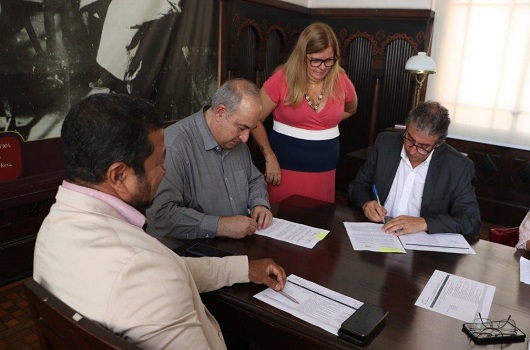Fiocruz and DNDi sign a Strategic Alliance Agreement
06/03/2023
Oswaldo Cruz Foundation
Fiocruz and the Drugs for Neglected Diseases Initiative (DNDi) signed, this Wednesday (3/1), a Strategic Alliance Agreement, which expands and strengthens the relationship between the two institutions. The Alliance's goal is to implement, by 2027, actions that help ensuring that drugs are developed and delivered to patients in often neglected communities, in an agreement that should not be limited to Latin America.
Krieger and Sosa-Estani sign the agreement at Fiocruz Castle (photo: Peter Ilicciev)
In 2003, Fiocruz joined six other health institutions to found DNDi, in a joint effort to respond to the frustration of physicians and healthcare professionals who, in several countries, have been dealing with the lack of treatments capable of treating certain diseases or the fact that they only had ineffective, unsafe and inaccessible drugs. Unlike the previous Memorandums of Understanding between Fiocruz and DNDi – such as the one signed in 2022 for research and development of a dengue treatment – this agreement has a broader scope and establishes the formation of a Joint Strategic Committee to oversee present and future collaborations.
“This is a special day for us because it is changing the founding member relationship in many important projects to a Strategic Alliance, with a broader vision that will allow us to work simultaneously on several initiatives”, said Marco Krieger, vice-president of Production and Innovation in Health (VPPIS), who further signed the agreement as acting president, in the absence of Mário Moreira. “The COVID-19 pandemic has shown the importance of local contribution in tackling the problems that exist in the region. We had this with Chagas disease. The history of this institution shows the contributions of Brazilian and Latin American science in dealing with a disease that was a problem in the region. It is this spirit that we want to rescue”, said Krieger, at the Rare Works Library in the Moorish Castle.
Under the agreement, the Alliance will seek to promote the development of drugs and biopharmaceuticals for viral diseases and neglected tropical diseases; improve the access of neglected populations to drugs; promote clinical trials; foster open science and data sharing; in addition to educational initiatives on neglected diseases.
Moreover, to operationalize and achieve these goals was created the Committee, composed of six members from each Institution, which will supervise and discuss the planning and strategy of the Alliance. At least twice a year, its members should meet to address long-term collaboration points. And each resulting project must have a specific agreement.
For Sergio Sosa-Estani, executive director of DNDi for Latin America, the Strategic Alliance Agreement was “developed in a natural and solid manner”, an evolution of the relationship between the two Institutions and that could benefit the Global South. “Having the Chagas disease as a flagship in our portfolio shows Fiocruz's influence”, said Sosa-Estani, also highlighting the work on leishmaniasis, hepatitis C and, more recently, dengue. “The Strategic Alliance is an opportunity to contribute to the development of projects in the Global South. South-South cooperation is now a necessity, and without a doubt, Fiocruz has a tremendously important role in this. And we, at DNDi, feel that we have a responsibility to contribute to this dynamic”.
Through Fiocruz, the Joint Strategic Committee will consist of Marco Krieger; Sergio Arouca National School of Public Health researcher (ENSP) Jorge Bermudez; the coordinator of the Clinical Research Platform of the Vice-Presidency for Research and Biological Collections (VPPCB), André Bastos Daher; the technical advisor to the VPPIS, Jorge Carlos Santos da Costa; and by the Information and Communication Coordinator of the Vice-Presidency of Education, Information and Communication (VPEIC), Vanessa de Arruda Jorge. Bermudez and Daher already held seats on DNDi's Board and Technical Committee, respectively.
In addition to Sosa-Estani, DNDi will be represented in the Joint Strategic Committee by Chagas Disease leader, Jesús Pinazo; the director of the Cluster for Viral Diseases, Isabela Ribeiro; the director of the NTD-HAT-Filaria-Chagas Cluster, Stéphane Hugonnet; and Rudi Paye, director of Strategy and Operations.
Valber da Silva Frutuoso, advisor to the Foundation's Presidency Office, and Jadel Müller Kratz, manager of Research and Development and Partnerships at DNDi, will act as managers of the Alliance.
The signing of the agreement was attended, on behalf of Fiocruz, by Krieger, as acting president; Jorge Bermudez; the director of the Institute of Drug Technology, Jorge Mendonça; the assistant coordinator of the Fiocruz Global Health Center (CRIS), Pedro Burger; Valber Frutuoso; André Daher; Vanessa; the technical advisor to the VPPIS, Sandra Soares; the chief of Staff of the Immunobiological Technology Institute (Bio-Manguinhos), Daniel Godoy; and the advisor for International Affairs at the National Institute of Infectious Diseases (INI), Tiago Nery.
About the Institutions
Created in 2003, DNDi is an international non-profit drug research and development organization. It works to bring new treatments to neglected patients around the world. The Initiative works in collaboration with the international research community, the public sector and the pharmaceutical industry, among other partners.
With 122 years of existence, Fiocruz's mission is to produce, disseminate and share knowledge and technologies aimed at strengthening and consolidating the Unified Health System (SUS) in Brazil. The Foundation seeks to contribute to the promotion of health and quality of life of the Brazilian population, to the reduction of social inequalities and to the dynamics of innovation, having as its core values the defense of the right to health and broad citizenship.


